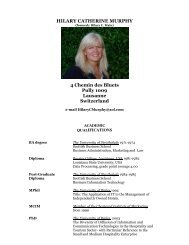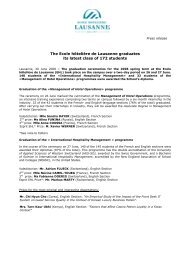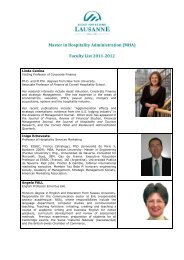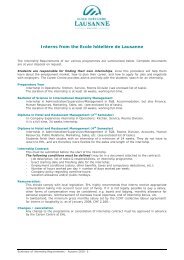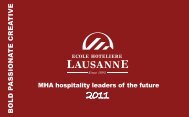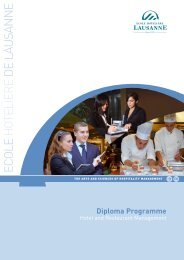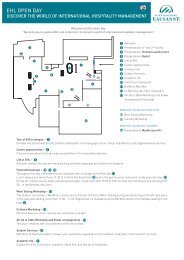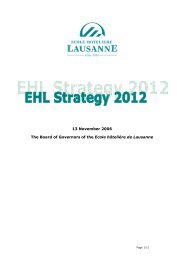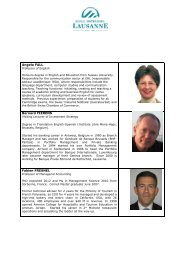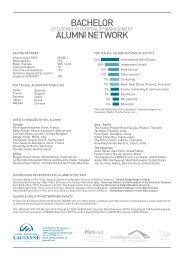EHL Course Catalogue 2011-2012 - Ecole Hôtelière de Lausanne
EHL Course Catalogue 2011-2012 - Ecole Hôtelière de Lausanne
EHL Course Catalogue 2011-2012 - Ecole Hôtelière de Lausanne
You also want an ePaper? Increase the reach of your titles
YUMPU automatically turns print PDFs into web optimized ePapers that Google loves.
YEAR 2 COURSES<br />
Year 2<br />
Module Value creation for the company Level Type Hours US Credits ETCS Credits*<br />
8211IC Financial management I B C 40 5.0 6.0<br />
8232IC Marketing and Revenue management I B C 30 4.0 4.0<br />
82131C Human resources and financial metrics I C 15 1.5 1.5<br />
82141C Foodservice and performance I C 10 1.0 1.0<br />
8215IC Lodging and performance I C 10 1.0 1.0<br />
8236IR Advanced <strong>de</strong>cision-making tools I B R 15 1.5 1.5<br />
Module Value creation in the experience economy Level Level Type Hours US Credits<br />
8221IC Services marketing and management I B C 40 4.0 4.0<br />
8222IC Customer interface in foodservice I B C 20 2.0 2.0<br />
8223IC Customer interface in lodging I B C 30 3.0 3.0<br />
8224IC Customer information management I B C 30 3.0 3.0<br />
Module Service process management Level Type Hours US Credits ETCS Credits*<br />
8231IC Service operations management I B C 40 4.0 6.0<br />
8233IC Hospitality processes I B C 30 3.0 3.0<br />
8230IC Processes and information systems I B C 30 3.0 3.0<br />
INTERNSHIP [20 weeks] 7.0 7.0<br />
Definition of a module<br />
According to the requirements of the Bologna Declaration that apply to all European universities, a study programme must<br />
be structured in the form of modules.<br />
A module comprises one or more learning units.<br />
<strong>EHL</strong> offers 2 types of module: integrated modules and non-integrated modules.<br />
Non-integrated modules bring together a set of in<strong>de</strong>pen<strong>de</strong>nt courses. Integrated modules inclu<strong>de</strong> a set of courses that all<br />
treat the same central question.<br />
Definition of the level of modules according to the Bologna Declaration:<br />
B: Basic level course: introduction module presenting the basic concepts of a discipline;<br />
I: Intermediate level course: modules that allow basic concepts to be studied in more <strong>de</strong>pth;<br />
A: Advanced level course: module that promotes and reinforces competencies.<br />
There are three kinds of module:<br />
C: Core course: module that corresponds to the principal discipline of the study programme;<br />
R: Related course: module that supports the principal discipline (e.g. conveying preliminary or complementary<br />
knowledge);<br />
M: Minor course: optional or complementary module.<br />
<strong>Ecole</strong> <strong>Hôtelière</strong> <strong>de</strong> <strong>Lausanne</strong> – <strong>Course</strong> <strong>Catalogue</strong> Page | 26



